Orlando Garage Door Services
1(407) 788-1229
Volusia Garage Door Services
1(386) 236-9100
1(407) 788-1229
1(386) 236-9100
Garage doors are key to our homes, giving us security and ease. Yet, they can break down or get old. Knowing how to fix them is vital for their smooth operation. This guide will help you with common garage door issues, DIY fixes, and when to seek professional help.
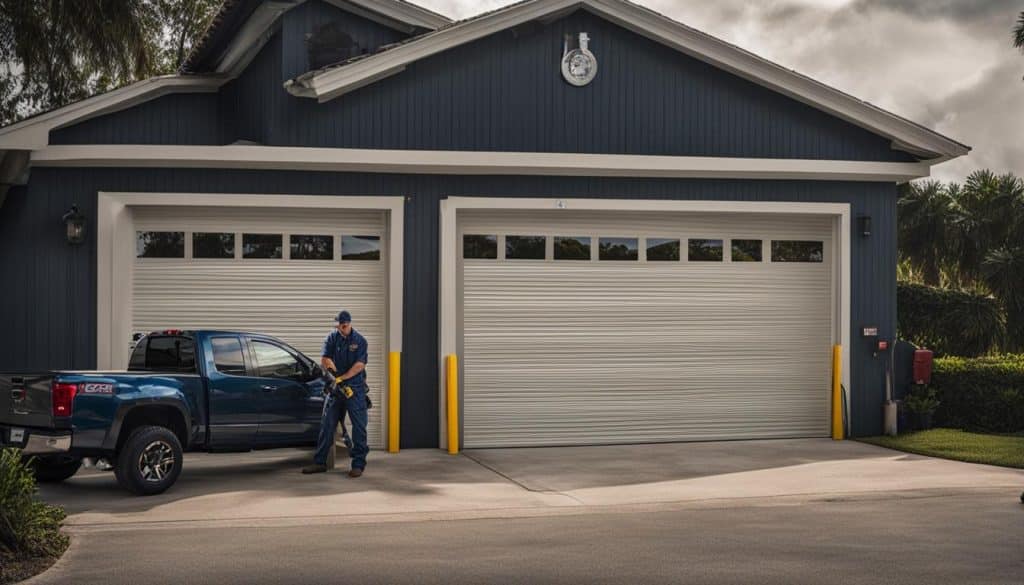
A. Broken or Damaged Springs
A broken spring is a common issue. Springs help the door open and close easily. If a spring breaks, the door may be hard to lift or slam shut. This can happen due to wear, rust, or extreme weather.
B. Misaligned or Damaged Tracks
Tracks guide the door as it moves. If they’re off or damaged, the door won’t move right. This can happen from accidents, bad installation, or loose parts.
C. Worn or Broken Rollers
Rollers help the door move along the tracks. Worn or broken rollers make the door noisy or hard to open. They can wear out or get damaged by debris or misaligned tracks.
D. Malfunctioning Garage Door Opener
A garage door opener controls the door’s movement. If it’s not working, the door might not open or close right. Issues can include electrical problems, worn gears, or remote or sensor issues.
A. Broken or Damaged Springs
Be careful with springs, as they’re under a lot of tension. If you’re good with DIY and have the right tools, you can replace them. But, if unsure, it’s safer to call a pro.
B. Misaligned or Damaged Tracks
To fix tracks, loosen the brackets and gently tap them into place. Use a level to make sure they’re straight. If tracks are badly damaged, it’s best to get a pro to replace them.
C. Worn or Broken Rollers
Replacing rollers is easy. First, lower the door by disconnecting the opener. Then, remove the old roller and put in the new one. Repeat for all rollers that need replacing.
D. Malfunctioning Garage Door Opener
Before trying to fix the opener:
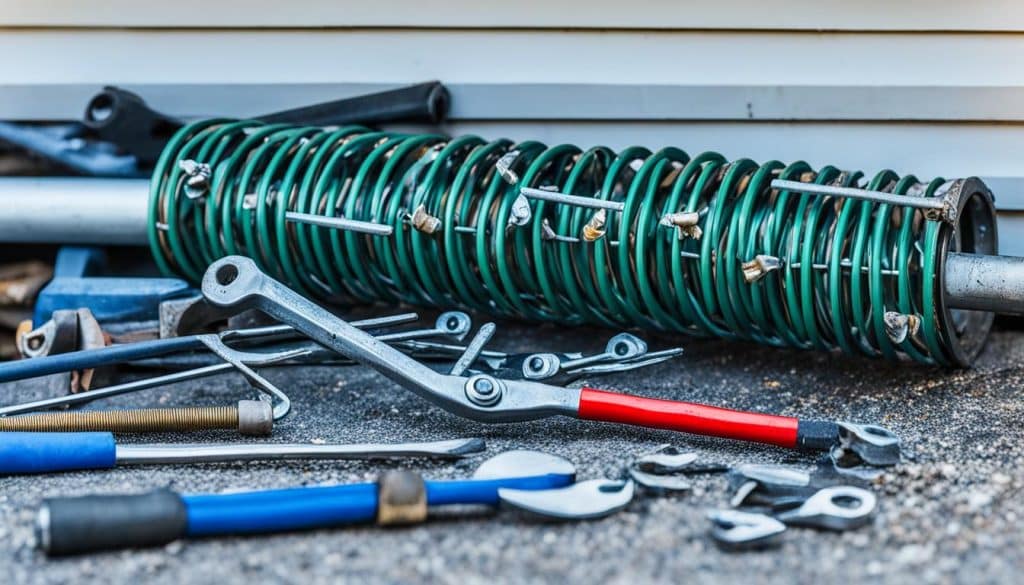
Some garage door repairs you can do yourself, but others need a pro. If you’re unsure, lack tools, or face high-tension parts like springs, call a pro. Also, if DIY fixes don’t work, it’s time for an expert.
Here are some specific situations when you should call a professional:
A. Torsion Spring Replacement: Torsion springs are very tense and dangerous for beginners. It’s safer to let a pro handle this repair.
B. Major Track Damage: Severe track damage needs a pro’s tools and know-how for safe and effective repair.
C. Electrical Issues: Electrical problems with your opener or wiring are risky. A pro can fix it safely and avoid damage.
D. Recurring or Complex Issues: If DIY fixes don’t solve the problem, a pro can find and fix the real issue. This saves time and stress.
Keeping your garage door in good shape can prevent many repairs. Here are some tips:
A. Regularly Inspect and Lubricate: Check for wear or damage on springs, cables, rollers, and tracks. Use silicone or lithium-based spray to keep moving parts smooth.
B. Keep Tracks Clean: Clean tracks to avoid roller damage and ensure smooth operation.
C. Tighten Loose Hardware: Check and tighten loose bolts or screws. Vibration can loosen them over time.
D. Test the Door Balance: Lift the door halfway without the opener. If it’s hard or won’t stay up, springs might need adjustment or replacement. A pro should handle this.
E. Test Safety Features: Test the auto-reverse feature by placing an object in the door’s path. The door should reverse automatically. If not, see your manual or call a pro.
A working garage door is key for your home’s security, insulation, and convenience. Knowing common repair problems helps with DIY fixes and knowing when to call a pro. Regular care can prevent issues and extend your garage door’s life, ensuring smooth operation for years.
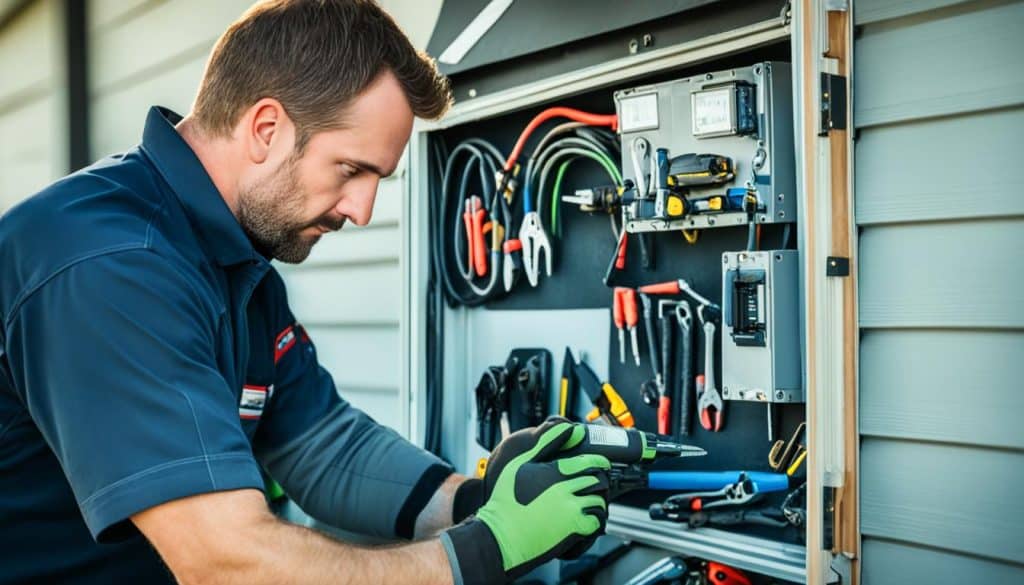
Experiencing persistent garage door issues despite DIY efforts? Unusual sounds or movement occur? Visible damage to the door components, or difficulty opening and closing? Find out if you need professional repair.
Are you still struggling with your garage door after trying to fix it yourself? From loud noises to broken springs, some problems might need a professional touch for a lasting solution.
Don’t let these issues disrupt your daily routine – seek expert help to fix those stubborn problems and ensure smooth and secure operation. Whether it’s tracks out of line or strange sounds during use, professional repair services with top-notch parts can provide reliable solutions for your peace of mind.
If you’ve been dealing with persistent garage door issues despite your DIY attempts, consider reaching out to professionals who can efficiently diagnose and resolve the underlying problems.
When your garage door makes strange sounds or moves unevenly, it could indicate underlying problems. Don’t ignore grinding, scraping, or banging noises as they may signal worn-out parts or misalignment.
If the door jerks or moves unevenly while opening or closing, there might be issues with tracks, rollers, or springs. Act promptly to prevent further damage and ensure smooth operation.
Recognizing odd sounds and movements from your garage door is essential in avoiding safety risks and costly repairs later on. Keep an eye out for any unusual behavior to address maintenance or repair needs promptly before they become more severe issues like system failure.
If you see dents, cracks, or warping on your garage door, it could affect how it works and compromise security. It’s important to get these issues fixed quickly to prevent more damage and keep your property safe.
Ignoring visible damage may lead to bigger and more expensive repairs later on. Contact a trusted professional to assess the problem and make quality repairs using top-notch parts for a lasting solution.
A damaged garage door not only looks bad but also can be unsafe. Fixing visible damage right away ensures that your door works smoothly and gives you peace of mind about your property’s security.
Experiencing difficulty in opening or closing your garage door? Don’t risk frustration or safety hazards – it’s time to seek professional repair. Signs like slow operation, jerky movements, or uneven gaps indicate the need for expert intervention.
Ignoring these signs can result in costly repairs later on. Contact a reputable garage door service like Emerald Garage Door Services for swift and reliable assistance. Their experienced team will diagnose the issue accurately, use high-quality parts for durable repairs, and ensure smooth and safe functioning of your garage door.
Remember that persistent difficulty in opening or closing a garage door might indicate an underlying problem that needs immediate attention from professionals. Ignoring such issues could lead to further damage and inconvenience in the future if not addressed promptly by a trusted repair service.
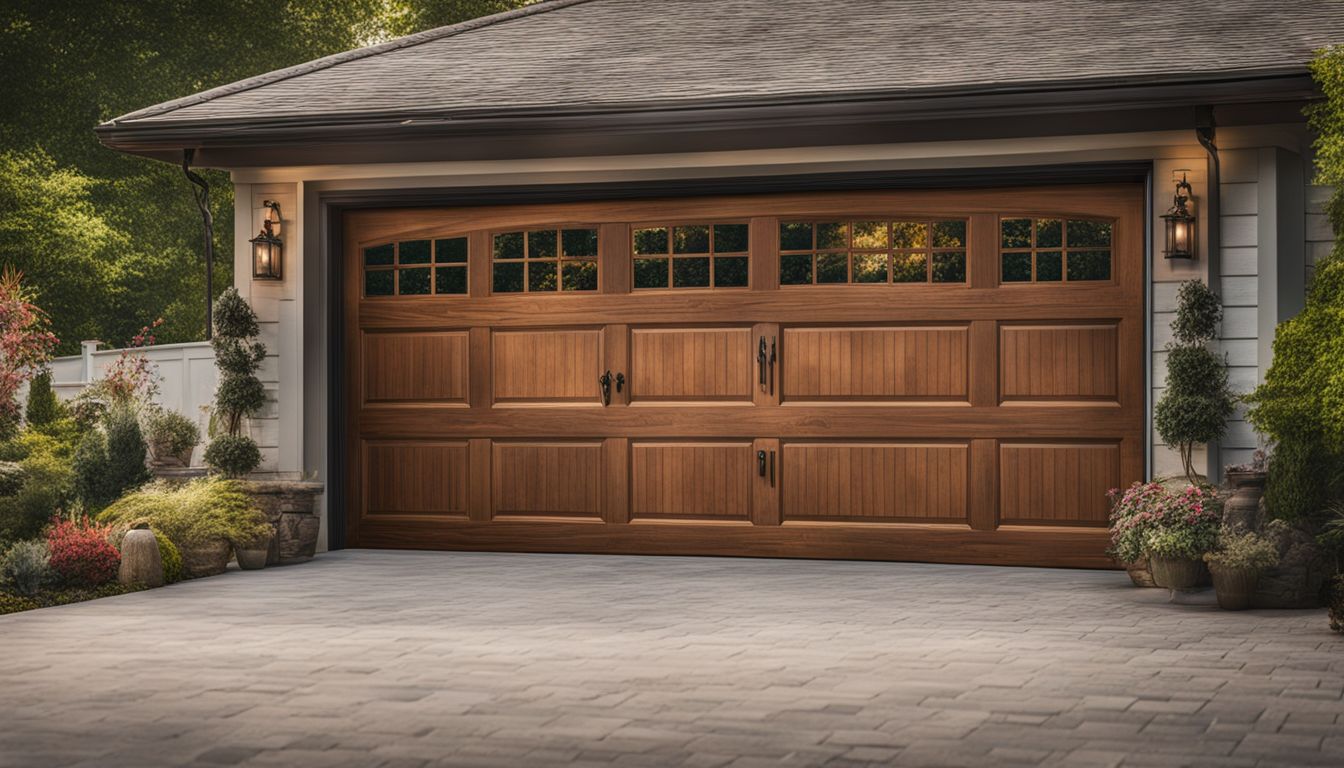
Choose a company with proven experience and expertise in garage door repair. Look for quality parts, positive customer reviews, and quick response time for emergency repairs.
With years of experience in the garage door industry, our team at Emerald Garage Door Services is equipped to handle a wide range of repair and installation needs. Our technicians are highly skilled and knowledgeable in diagnosing issues such as broken springs, misaligned tracks, or malfunctioning sensors.
We use high-quality parts to ensure long-lasting repairs and offer professional guidance on choosing the right garage door for your specific needs. By prioritizing expertise and customer satisfaction, we ensure that every homeowner or business owner receives top-notch service tailored to their individual requirements.
As an experienced garage door services provider in Central Florida, we understand the unique needs of homeowners and business owners when it comes to their garage doors. Whether it’s a residential installation or a commercial repair, our extensive expertise allows us to deliver efficient solutions using quality materials and reliable techniques.
With a focus on customer-centric service delivery coupled with advanced technical knowledge, we strive to exceed expectations with every project.
Our garage door repairs and installations only use high-quality parts and materials to ensure long-lasting durability. We are committed to using top-notch components, guaranteeing smooth and efficient operation with minimal future maintenance needs.
By choosing premium materials, we aim to deliver lasting repairs that provide optimal performance for homeowners and business owners seeking reliability and peace of mind.
Customers rave about the exceptional service they received from Emerald Garage Door Services. They praise the prompt response, professional expertise, and courteous approach of the technicians.
Their testimonials highlight reliable repairs, high-quality parts, and guaranteed satisfaction with every visit by the company’s skilled professionals. Homeowners and business owners commend the transparency and efficiency in resolving garage door issues promptly, making Emerald Garage Door Services their go-to choice for all their repair and maintenance needs.
Whether it’s fixing broken springs or addressing noisy operations, customers trust Emerald Garage Door Services for top-notch repair solutions that provide peace of mind. The testimonials emphasize how this company has consistently delivered on its promise of stellar customer service and excellent products while treating every client like family.
For urgent garage door issues like malfunctioning sensors, broken springs, or unexpected operations, our team guarantees a fast response. We’re available 24/7 and prioritize your property’s safety.
Contact us for swift expert solutions to any garage door emergency – we’re here to help when you need it most.
When you choose a professional garage door repair company, it’s crucial to consider the warranty on repairs. A reliable company like Emerald Garage Door Services in Central Florida provides a solid warranty, ensuring that your repairs are covered for an extended period.
This guarantee offers peace of mind and reflects the company’s confidence in their workmanship, instilling trust and assurance in homeowners and business owners alike. With our customer satisfaction guarantee and top-notch service, rest assured that your garage door repair needs are in good hands.
For any questions or to book a repair service, contact Emerald Garage Door Services at (407) 788-1229 today!
Ensure long-lasting repairs and increased safety, providing expert diagnosis and advice to offer peace of mind.
At Emerald Garage Door Services, our skilled team delivers durable repairs for your garage door using top-notch parts and materials. Rely on us for long-lasting solutions that provide peace of mind.
Make sure your garage door is a strong barrier, keeping your home or business safe from intruders. Use top-notch parts and skilled repairs to keep your garage door in good shape. Opt for professional services to ensure the safety of your property.
Skillful installations with tough materials provide extra security to protect your belongings and family. Regular maintenance keeps all security features working well, giving you peace of mind around the clock.
When facing complex garage door issues, having a professional diagnose and provide expert advice can be crucial. From identifying underlying problems to recommending the most effective solutions, experienced technicians can offer tailored guidance based on specific needs and ensure safety and functionality for your garage door system.
Expert diagnosis and insightful advice contribute significantly to addressing long-standing concerns and preventing future issues, providing peace of mind for homeowners and business owners alike.
For any homeowner or business owner seeking efficient garage door repair services, relying on expert diagnosis and advice from seasoned professionals like Emerald Garage Door Services ensures comprehensive solutions customized to their unique requirements.
Keep your garage door in top shape with our professional maintenance and repair services. We have the expertise to ensure lasting repairs, improving safety and security for your home or business.
Count on our 24/7 availability and customer satisfaction guarantee for stellar service whenever you need it. Our experienced team can accurately diagnose issues and offer expert advice, giving you peace of mind that your garage door is in reliable hands.
Rely on our dependable garage door services to keep things running smoothly every day. Get in touch now to address all your garage door needs promptly!
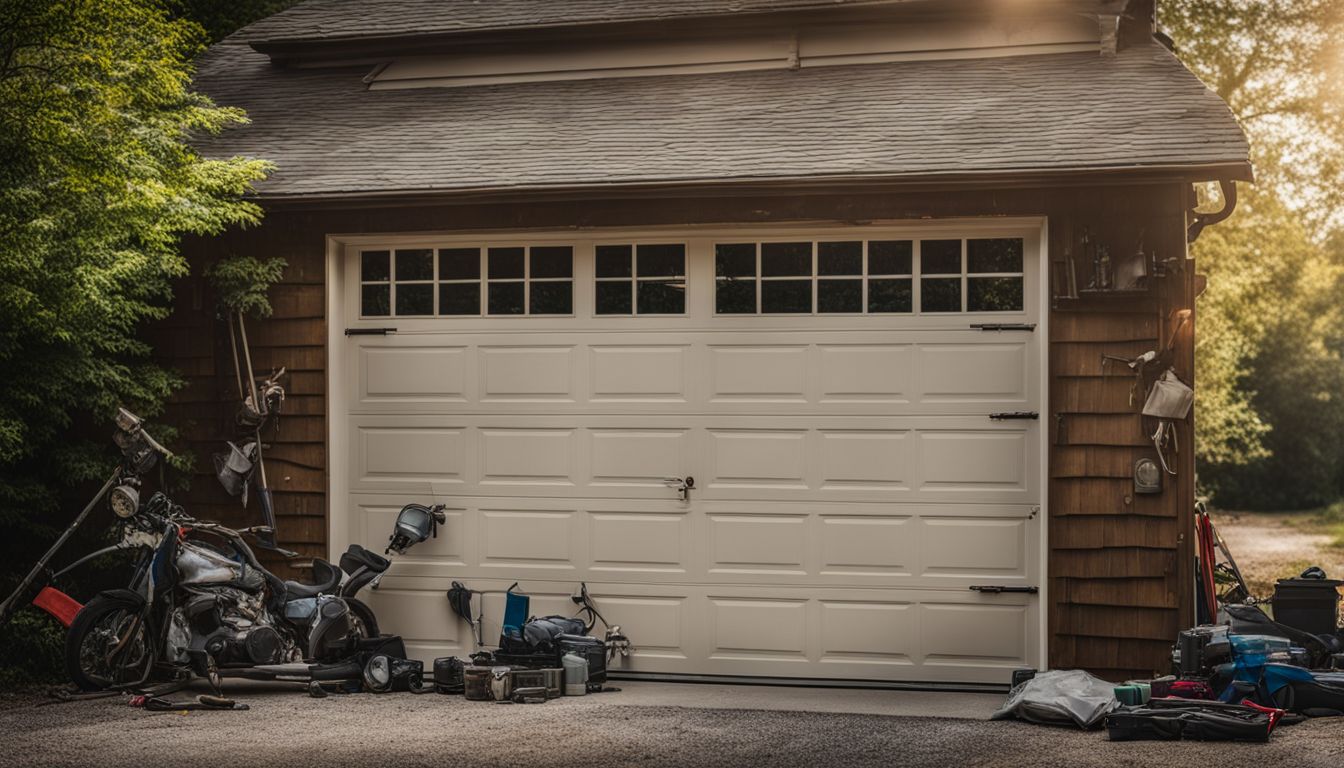
Regular maintenance keeps your garage door functioning smoothly and can prevent costly repairs. For immediate attention to any garage door issues, our 24/7 emergency services are just a call away.
Keeping your garage door well-maintained is crucial for homeowners and business owners to ensure it operates smoothly and safely. Regular maintenance helps prevent unexpected breakdowns, costly repairs, and inconvenience by lubricating moving parts, tightening hardware, testing safety features, and ensuring proper balance.
This approach can prolong your garage door’s lifespan while maintaining its peak performance, providing you with peace of mind knowing your garage door is always in top condition.
Keep your garage door in top condition to prevent costly repairs. Regularly lubricate moving parts, tighten loose hardware, and test safety features for smooth operation. Don’t forget to schedule professional inspections for early issue detection.
These proactive measures can save money on major repairs in the future.
Routine maintenance and prompt problem-solving help homeowners and business owners avoid unnecessary expenses on their garage door systems. Keeping up with maintenance not only saves money but also ensures reliable functionality over time.
Experiencing a sudden garage door problem? Our 24/7 emergency repair services can quickly address issues like broken springs, malfunctioning sensors, or noisy operation. Our experienced team is prepared to provide immediate attention and resolve your garage door problems promptly with high-quality parts and expert diagnosis for long-lasting repairs.
Call us anytime at (407) 788-1229 for reliable emergency assistance.
Upgrade your garage door to a smart opener for enhanced convenience and security. Gain insights into installation tips for integrating modern smart technology into your garage.
Upgrade your garage door opener to a smart system for added convenience and security. Control your garage door remotely from your smartphone, ensuring easy access even when you’re away.
Receive real-time alerts and monitoring capabilities to stay updated on the status of your garage door at all times. Embrace modern innovation that seamlessly integrates with smart home systems for a more connected living experience.
Experience hands-free operation as the smart garage door opener recognizes your vehicle upon arrival, automatically opening without needing to press any buttons or keypads. Enhance security by receiving notifications on every door activity, allowing you to monitor who accesses your property and when.
When installing a new garage door, consider the material and style that best suits your needs. Insulated steel doors provide durability and energy efficiency, while wooden doors offer a classic look but may require more maintenance.
Ensure professional installation for smooth and safe operation, promoting longevity for your investment.
Selecting an automatic opener with advanced security features can enhance convenience and safety. Additionally, proper measurement of the opening is crucial to ensure a perfect fit.
Struggling with a garage door problem? Find expert answers to common questions and simple troubleshooting tips. Get clarity on DIY fixes and when it’s time to call in professional help.
Need answers about fixing your garage door? Our FAQs cover costs, maintenance tips, safety features, and upgrades. Find troubleshooting advice and informed decisions for efficient and safe operation.
Whether it’s noisy or broken springs, get tailored solutions.
Confused about when to seek professional help for your garage door? Discover practical advice for homeowners and business owners. Address concerns about emergency services and learn the benefits of regular maintenance with our troubleshooting tips.
Maintain your garage door by tightening loose hardware, lubricating moving parts, and cleaning tracks. Test the door’s balance and safety features regularly. Look for visible damages or obstructions that may affect its operation.
Seek professional help if problems persist despite DIY maintenance or if you notice unusual sounds or movement from the door.
Take care of your garage with simple DIY tasks like regular lubrication, visual inspections, and safety feature tests. Keep an eye out for persistent issues and odd movements, getting professional assistance as necessary.
Contact us for immediate assistance with all your garage door needs, and rest assured with our customer satisfaction guarantee. Get in touch via phone or email to experience our exceptional service and unparalleled commitment to your satisfaction.
Need immediate help with your garage door? Call us at (407) 788-1229 for installation, repair, maintenance, or emergency services. Our team is available 24/7 to address any concerns promptly.
Email us at EmeraldGarageDoorServices@gmail.com for inquiries or appointments. We’re committed to exceptional customer service and ensuring your satisfaction.
Questions about our services or how we can meet your garage door needs? Call us at (407) 788-1229 or email EmeraldGarageDoorServices@gmail.com. We’re here around the clock to provide expert solutions tailored to your specific requirements.
Easily schedule your garage door repair or maintenance service online. Choose a time that works for you and get prompt confirmation of your booking. Our system makes it hassle-free to access expert assistance in Central Florida, whether you’re a homeowner or business owner.
We are committed to delivering high-quality workmanship using top-notch parts and materials for lasting repairs and installations. If you’re not satisfied with our service, we’ll make it right.
Our guarantee provides peace of mind for homeowners and business owners.
Our promise of outstanding customer service and excellent products is unwavering. Your complete satisfaction is always our top priority. Contact us today for dependable garage door services exceeding expectations in Central Florida!
Look out for a noisy garage door, broken springs, frayed cables, or if your door refuses to open or close smoothly. These are clear signals that it’s time for some garage door repair.
While you might be tempted to fix minor issues like lubricating noisy rollers yourself, complex problems with the garage door motor or cable require professional expertise. It’s always safer and more efficient to call in experts for overhead garage door repair.
To keep your garage running smoothly and avoid unexpected breakdowns, scheduling a check-up at least once a year is wise. Regular maintenance can catch issues like a worn-out roller or an impending spring break before they turn into bigger problems.
Upgrading your old doorway with a new one not only fixes immediate issues but also enhances home security and boosts curb appeal – potentially increasing your home’s value! Plus, newer models often feature better insulation and advanced safety features that make them worth considering for replacement.
We are a family-owned business that takes pride in providing exceptional garage door service to the residents of Central Florida
A satisfied customer every time. We won’t rest until the job is done and you are 100% happy.